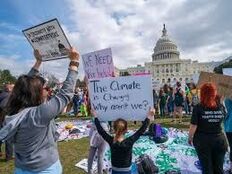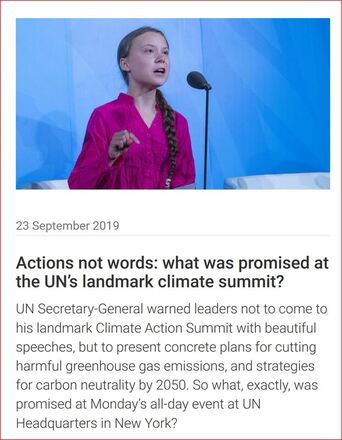 Photo Credit: CBS News
Photo Credit: CBS News
On September 20, 2019, school students around the world left their classrooms and joined in protesting the lack of action by governments to deal with the Climate crisis. They numbered in the millions. The goal was to put politicians on notice that inaction was simply unacceptable. The consequences of climate change are drastic and dramatic. If left unaddressed, today’s youth’s bright future will be dimmed by the destructive impacts of the forces that cause climate change and by the forces generated as a result of climate change.
On September 20, 2019, school students around the world left their classrooms and joined in protesting the lack of action by governments to deal with the Climate crisis. They numbered in the millions. The goal was to put politicians on notice that inaction was simply unacceptable. The consequences of climate change are drastic and dramatic. If left unaddressed, today’s youth’s bright future will be dimmed by the destructive impacts of the forces that cause climate change and by the forces generated as a result of climate change.
| Naturally, there were critics of this activism. Children, some argued, were supposed to be in classrooms learning. I suspect that the activists learned more in their effort to be heard over the lobbyists’ din than they would have learned in the classroom. In conjunction with the classroom, however, an amazing teaching/learning opportunity presented itself. The “Climate Strike” offered teachers and students an opportunity to explore science, math, geography, cartography, political science, history, literature, the arts, religion, media, sociology, and economics. Few topics offer such rich subject areas. Furthermore, the personal experience of actively protesting the failure of politicians to protect their future is quite a learning experience. No matter what the critics argue, students do have Constitutional rights. One of them is the right to peacefully assemble for the redress of grievances. In the past, I was skeptical of adults who used the “back in my day” argument. That day was past, I felt, and the present demanded looking toward the future. I’m reconsidering that position. In my day as a child and then young adult, we counted on adults to protect us from thermal nuclear war. And the adults fulfilled that obligation, obviously. But today, too many adults are failing their children. The children are angry and emotional about that. The intensity of speeches at the Climate Strike and the United Nations Climate Summit a few days later makes clear the frustration that youth are experiencing. |
That frustration is the product of inaction by politicians to deal with climate change. Politicians legislate on all kinds of issues, and they lack expertise on many of them. They hold hearings with experts as witnesses. These witnesses, in effect, educate politicians to the point where they are capable of writing laws. But on the climate issue, many politicians either hide behind the “I’m not an expert” excuse or assert the fossil fuel industry’s talking points.
These politicians must be voted out of office for effective legislation to be enacted. That requires activists and all those engaged in this issue to register to vote. This can be done online at http://vote.gov. The deadline to vote in the November 2019 off-year election is October 7, 2019 in Pennsylvania. Check your state or voting entity for the registration deadline. Once registered, learn the positions of candidates on climate change and environmental issues. Civic responsibility requires that you be informed. Finally, be sure to vote on election day.
These politicians must be voted out of office for effective legislation to be enacted. That requires activists and all those engaged in this issue to register to vote. This can be done online at http://vote.gov. The deadline to vote in the November 2019 off-year election is October 7, 2019 in Pennsylvania. Check your state or voting entity for the registration deadline. Once registered, learn the positions of candidates on climate change and environmental issues. Civic responsibility requires that you be informed. Finally, be sure to vote on election day.


 RSS Feed
RSS Feed